The AI Grapple
Unravel the complexities of AI with The AI Grapple Podcast, hosted by Kate vanderVoort. Dive into thought-provoking discussions on the most critical AI issues shaping our world. Perfect for marketers and business professionals, this podcast is your guide to integrating AI responsibly and ethically into your organization. Join us as we navigate the future of technology and its profound impact on humanity.
Episodes
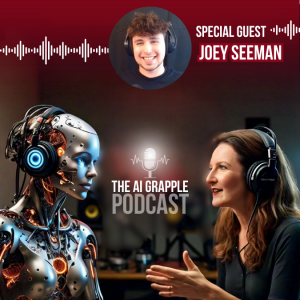
4 days ago
4 days ago
In this episode of The AI Grapple, Kate vanderVoort is joined by Joey Seeman - the young and sharp CEO of Nova Echo AI, a company making big waves in the conversational voice AI space.
Joey shares how voice AI can now make and answer calls that sound just like a human, helping businesses scale their sales and support teams with speed, consistency and personality. He also tackles the big questions - job loss, government regulation, and whether AI will eventually build itself.
Joey brings the perspective of a younger generation who’ve grown up with AI as a daily reality. While Kate doesn’t always see the tech through the same lens, the conversation is packed with thoughtful challenges, philosophical questions, and a clear look at what’s already here - and what’s coming.
If you’ve ever been stuck talking to a chatbot, worried about your job, or curious about how businesses can use voice AI today, this is a must-listen.
💡 Key topics we cover
- What makes voice AI different from chatbots?
How generative AI changed the game for customer serviceWhy Joey sees voice as the natural evolution of business communicationWhy people rarely realise they’re speaking to a bot
- Job loss or job shift?
Why Joey says his tech isn’t replacing jobs - yetThe difference between short-term efficiencies and long-term societal impactWhat happens when AI starts building AI
- Generational gaps and mindsets
How Gen Z is casually adopting AI tools without fearWhy older generations are asking the big-picture questionsJoey’s thoughts on long-term thinking, learning speed, and wisdom
- Regulation, power and responsibility
Why global consensus on AI safety may never happenHow Joey thinks governments - and Elon Musk - need to step upWhat could go wrong if humans step out of the AI development loop
- The future of voice AI
How nonprofits can reduce fundraising costs using AIWhy Joey believes voice AI will become a trillion-dollar marketWhat’s coming next - accents, faster responses, and custom featuresHow even small businesses can access the tech starting at approx. $333 per month
📣 Connect with Joey 🌐 Website: https://novaecho.ai 📸 Instagram: @joey_seeman 📸 Nova Echo AI: @nova_echoai
👍 Like what you heard? Subscribe to The AI Grapple on your favourite platform and leave us a rating or review. It really helps others find the show. 🎧 Listen now → www.aigrapple.com 💬 Join the conversation: AI Success Lab Facebook Group
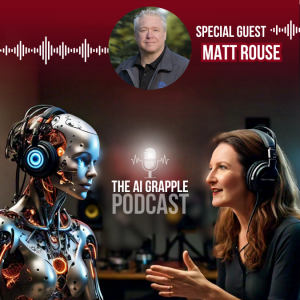
6 days ago
6 days ago
In this episode of The AI Grapple, Kate vanderVoort is joined by Matt Rouse - a tech-savvy marketer, author, and business strategist on a mission to help people and businesses thrive in an AI-driven world.
Matt shares insights from his book Will AI Take My Job? and years of hands-on experience helping companies adapt to AI tools. From job security and the impact on industries, to AI agents and the future of search, this conversation is full of practical advice, real stories, and sharp warnings.
We talk about what jobs are safe, which ones are at risk, and why the companies that embrace AI without a clear plan are likely to fall behind. If you’re in marketing, management, or running a business, this episode is packed with things you’ll want to know now - before AI makes the decisions for you.
💡 Key topics covered
- Will AI actually take our jobs?
Which roles are most at risk - and which ones are safer
Why middle-skill, process-heavy jobs are the most exposed
The hidden danger of “cascade failure” in job markets
What universal basic income could mean in an AI future
- How to protect your role or business from automation
Why every professional should be learning AI now
The power of becoming an “AI orchestrator” - even if you’re not technical
How AI can help the bottom 30% of workers perform like top-tier talent
Ways to bring AI in as a partner, not a threat
- The real state of AI inside companies
87% of companies want to use more AI - but can’t find the talent
Over half of staff already use AI - and many are hiding it
Why the C-suite may have no idea how much AI is actually being used
What boards and managers need to get right before it’s too late
- Search is changing: from SEO to AEO
How AI is reshaping the way people discover businesses
Why answer engine optimisation (AEO) is the next frontier
How Matt became the “AI Chicken Wrangler” and what it teaches us about branding for AI
Why simple, consistent messaging in the right places still wins
- AI agents, software on demand and the rocket ship problem
What semi-autonomous AI agents will do (and why they’ll annoy us first)
Why most SaaS products are at risk of being replaced
How to think about long-term value when building AI tools
The “rocket ship” challenge - what if the next version gets there before you do?
🔚 Final words from Matt
“Play with AI. Make it part of your life. Whether it’s planning meals or writing emails, the more familiar you get now, the better off you’ll be when it really matters.”
Matt’s message is simple - if you’re waiting for someone to tell you how to use AI, you’re already behind. Experimenting, learning and integrating AI into your daily work is the best insurance policy for your career and business.
📣 Connect with Matt
🌐 Website: https://matthewrouse.com 📘 LinkedIn: https://www.linkedin.com/in/mattmrouse/ 🔵 Bluesky: @authorMattRouse
👍 Like what you heard?
Subscribe to The AI Grapple on your favourite platform and leave us a rating or review. It really helps others find the show.
🎧 Listen now → www.aigrapple.com 💬 Join the conversation https://www.facebook.com/groups/aisuccessslab
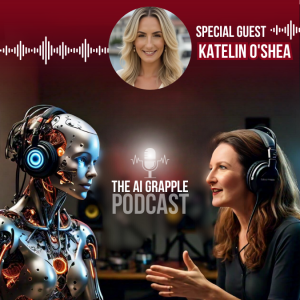
Tuesday Mar 18, 2025
Ep 28: Katelin O'Shea on Practical AI Without the Hype
Tuesday Mar 18, 2025
Tuesday Mar 18, 2025
In this episode of The AI Grapple, Kate vanderVoort sits down with Katelin O’Shea - Team Project Manager for the AI team at Dropbox Global Support, PRINCE2 Practitioner, and founder of AI That Works. With a background in operations and project delivery, Katelin brings a grounded, structured, and incredibly practical approach to AI that is accessible to absolutely everyone - no technical background required.
Her journey with AI began in 2021 with Copy.ai, using it to streamline complex grant applications. Since then, she’s experimented with everything from launching an AI-generated art store to building her own custom GPTs that automate the admin in her personal life. Along the way, she's developed a step-by-step AI implementation framework that's as effective for small businesses as it is for large enterprises.
What We Covered (and What You’ll Take Away):
💡 Start with the problem, not the toolKatelin explains how shiny object syndrome can derail AI projects before they even begin. Her advice: identify the process first, then audit for opportunities.
⚙️ Her 4-question test to decide if AI is a fitAsk yourself: Is the task repetitive? Time-consuming? Data-heavy? Frustrating? If yes, AI could help and you’ll be able to clearly measure the value.
📬 How she beat a parking ticket using ChatGPTFrom voice-to-text storytelling to a legally formatted appeal letter, Katelin used AI as her legal assistant .... and won.
🧠 AI is 70% people, 30% techYou can have the best tools in the world, but if your team doesn’t understand or trust them, it won’t stick. Katelin shares how she dedicates 30% of implementation time to building team confidence and tackling fears around job security.
📊 Messy data? Don’t let it stop youStart with a small pilot and clean only the data you need. Katelin shares how large companies can avoid paralysis and how small businesses have an edge when building from scratch.
🗣️ Why AI transparency mattersWhether it’s an AI avatar or a chatbot, Katelin believes in being upfront with customers. Hiding it erodes trust - especially when AI inevitably makes a mistake.
🧠 Is AI changing how we speak?From “navigating” to “demystifying,” Katelin questions whether AI-generated content is reshaping our language - and how that might influence communication more broadly.
📦 Custom GPTs that solve real problemsFrom her personal recipe and shopping list assistant “Susie” to writing legal letters for her mum, Katelin shares how small, tailored GPTs are her secret weapon for saving time and reducing friction.
🎨 Creativity without codingWith platforms like Replit, Cursor, and Lovable.dev, Katelin is excited about the ability to bring ideas to life without needing to be a developer. AI is lowering the barrier to innovation like never before.
🔮 What’s next in AI?For Katelin, it’s all about accessibility, empowerment, and using AI to enhance - not replace - human creativity, strategy and connection.
🔗 Connect with Katelin on LinkedIn: linkedin.com/in/katelinoshea
🎙️ Listen now on your favourite podcast platform, and don’t forget to subscribe, rate, and share this episode with a friend or colleague who’s ready to make AI actually work for them.
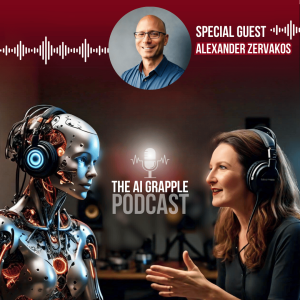
Friday Mar 14, 2025
Friday Mar 14, 2025
In this episode of The AI Grapple, Kate vanderVoort is joined by Alexander Zervakos, co-founder of Theryo – an AI-powered mental health platform transforming how therapy is experienced on both sides of the couch.
Alexander is a seasoned entrepreneur and AI specialist who previously built successful ventures in healthcare and finance. But it was his own deeply personal experience navigating therapy that became the catalyst for creating Theryo. Frustrated by a lack of structure and meaningful progress in his own sessions, Alex built a simple tool to guide his journey. That tool became the foundation for Theryo – a platform now helping mental health professionals enhance therapeutic relationships through AI-generated insights, session summaries, and care planning.
Together, we explore how AI can augment mental health care while preserving the vital human connection at its heart.
🔑 Key Highlights
💡 The Origin of Theryo
Alex’s therapy journey sparked the creation of Theryo when he saw an opportunity to bring more structure, reflection and continuity into the process.
Initially built as a personal support tool, it grew into a powerful platform that helps clients track their emotions and progress while giving therapists richer insight into the full picture between sessions.
🧠 AI as a Therapy Co-Pilot
Clients journal daily, with AI analysing entries to generate weekly summaries.
Therapists get session transcriptions, automatic notes, and cross-analysis with the client’s journal, enabling a more prepared, personalised, and productive session.
🔐 Data Privacy & Ethical AI
Theryo is built with strict privacy protocols: encrypted data at rest and in transit, de-identified records, and limited access.
Alex emphasises the importance of using platforms with robust safety protocols and professional oversight, likening it to trusting a bank with your money.
🚫 Not a Replacement for Therapy
Theryo does not deliver therapy. It enhances it.
AI acts as a guide or co-pilot, but always under the supervision of a qualified therapist.
The platform includes basic safety guardrails, such as flagging potential harm, but does not currently alert therapists automatically due to legal complexities.
🔮 Where AI is Heading in Mental Health
Alex sees AI helping to close the global gap in access to mental healthcare.
From burnout in the therapist workforce to underserved communities, AI can help make support more scalable, affordable, and available 24/7.
He envisions a future of seamless integration—where AI assists, never replaces, the therapeutic relationship.
🎓 AI in Education & Personalisation
Kate and Alex discuss how similar models could be applied to coaching, corporate performance, or even classroom settings.
Wearables and real-time feedback loops could dramatically personalise both education and mental health care in the years ahead.
🛠️ Favourite Tools
Alex’s current go-to platforms include:
ChatGPT
Anthropic Claude
Perplexity AI – his preferred Google alternative for fast, ad-free, reliable search
🔗 Connect with Alex & Theryo🌐 Website: www.theryo.ai🔗 LinkedIn (Alex): linkedin.com/in/alexanderzervakos🐦 X / Twitter: @TheryoAI📸 Instagram: @theryoai
🎧 Listen NowAvailable on your favourite podcast platforms. Search for The AI Grapple and subscribe to stay up to date with the future of AI in business and life.
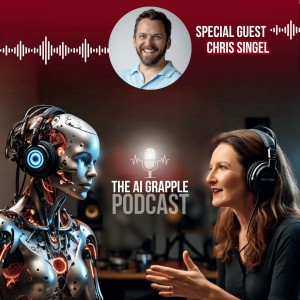
Tuesday Mar 11, 2025
Ep 26: The SEO Shift to AEO: Chris Singel on What AI Gets Wrong (and Right)
Tuesday Mar 11, 2025
Tuesday Mar 11, 2025
In this episode of the AI Grapple Chris Singel joins Kate vanderVoort for a wide-ranging, funny, and thought-provoking conversation that spans the full weird and wonderful world of artificial intelligence. From his early days coding websites on dial-up, to writing a book with AI in the shower (yes, literally), to deep dives on automation, job loss, and the ethics of AI-powered decision-making - this is an episode that will both entertain and challenge your thinking.
Chris blends sharp insights with plenty of laughs, and doesn’t hold back when talking about hallucinations, deepfakes, the illusion of control, and why letting robots do the work might not be the worst idea after all.
🔥 Key Highlights
🕹️ Dial-Up Days to AI Days Chris shares how his tech journey started in middle school, building a website for his local movie theatre on dial-up internet. From there, he navigated politics, public policy, and a thriving comedy career before landing in digital marketing - and eventually founding his own agency, Delta Digital.
📘 Writing a Book in the Shower (Almost) In March 2023, after seeing Google Bard launch, Chris wondered: Can AI write a book about AI? Twelve minutes and one marketing push later, his AI-generated book Think Like an AI became a #1 new release on Amazon. It wasn't perfect - but that was kind of the point.
🤖 LLMs vs Reasoning Models Chris likens Large Language Models to entry-level employees - they do what they’re told but don’t think critically. Reasoning Models are more like mid-level managers. So what happens when AI reaches C-suite capabilities? Who’s making the decisions then?
🎨 AI and Creativity: Killer or Catalyst? While many worry that AI will kill creativity, Chris argues the opposite. By removing repetitive, low-value tasks, AI frees humans up to actually be creative again. Designers can design. Writers can think bigger. And marketers can dream up ideas beyond just moving pixels around.
🌍 Comedy Meets Code Chris reflects on how AI still struggles with humour - subtext, timing, and cultural context are difficult to replicate. But he’s also used AI to brainstorm jokes, generate story ideas, and even build Dungeons & Dragons campaigns. AI might not replace comedians, but it’s already helping them.
🔍 The SEO Shift to AEO (Answer Engine Optimisation) AI search changes everything. Instead of driving traffic to your website, answer engines might just give users a response - and move on. Chris talks about the death of zero-click SEO, Google's history with AMP and Answer Boxes, and how marketers should now be thinking about discoverability in a searchless future.
🚨 Hallucinations & Misinformation Glue in a pizza recipe? Sure. Fake medical advice? Dangerous. Chris shares some of the real risks that come with trusting AI too quickly, especially when it fabricates sources or gets basic facts wrong with total confidence. The stakes aren’t just professional—they’re personal and even life-threatening.
👤 The Identity Crisis: Trust, Deepfakes & Disinformation From duplicate Facebook profiles of relatives to fake AI-generated nudes in high schools, Chris highlights the growing crisis of digital identity and trust. We’re entering an era where it’s hard to know what—or who—is real online.
⚖️ Governance, Responsibility & the Blame Game If an AI recommends the wrong medication or a faulty DIY fix, who's responsible? The developer? The platform? The end user? Chris dives into the growing AI governance conversation, the legal gray areas, and why we need urgent answers to very old questions about liability.
🌐 Global Tug-of-War: US vs EU vs China Kate and Chris discuss the differing global approaches to AI regulation. The EU is leaning into safety and ethics. The US is driven by market forces. China plays its own game. But with the internet being global, whatever rules one region sets will affect everyone.
💼 AI in the Workplace: Cut Costs or Cultivate Talent? Chris shares real examples from consulting with businesses, including how IKEA chose to retrain customer service staff as interior designers instead of laying them off. It’s a hopeful sign that AI doesn’t always have to mean job losses—it can mean reinvention.
⚠️ Human in the Loop: Still Essential From meeting notes that snitch to therapists’ AIs hallucinating patient thoughts, Chris underscores the need for a human in the loop. AI is powerful—but without oversight, it can also cause chaos.
🧩 The Unknowns: Superintelligence & What Comes Next Chris reflects on how AGI (Artificial General Intelligence) may be closer than we think. With rapid breakthroughs, we’ve moved from predicting progress in decades to months or weeks. If AI starts improving itself, the leap to Artificial Super Intelligence could be exponential—and the world as we know it might change overnight.
🎭 Human After All: The Role of Empathy, Storytelling & Meaning Despite all the tech talk, this episode is deeply human. Chris and Kate explore how AI can amplify empathy, enhance storytelling, and even help us better understand ourselves. But only if we stay involved—and intentional.
🔗 Connect with Chris
🌐 Website: Delta Digital Agency 📕 Book: Think Like an AI on Amazon 📱 LinkedIn: Chris Singel on LinkedIn
🎧 Listen NowAvailable on your favourite podcast platforms. Search for The AI Grapple and subscribe to stay up to date with the future of AI in business and life.
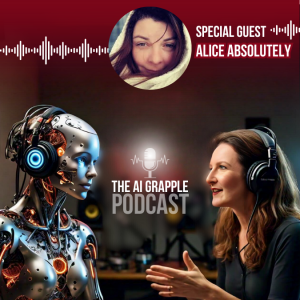
Tuesday Mar 04, 2025
Ep 25: AI, Fine Art & the Human Story – A Deep Dive with Alice Absolutely
Tuesday Mar 04, 2025
Tuesday Mar 04, 2025
In this thought-provoking episode of The AI Grapple, host Kate vanderVoort sits down with Amanda McCallister, the creative force behind Alice Absolutely, to explore the intersection of AI and fine art. Alice shares how she uses AI as a true artistic collaborator rather than a replacement, the ethical dilemmas she has encountered, and how AI-generated art reflects deep-seated human biases.
From her discovery of AI’s unexpected storytelling through image generation to her upcoming book on AI and the Art of War, Amanda challenges our understanding of authorship, creativity, and artistic ownership in the AI era. This episode is a must-listen for anyone curious about the future of AI in the creative industries.
Key Topics & Insights
🎨 AI as a Creative Partner, Not a Replacement
Amanda explains how she treats AI as a collaborator, much like working with another artist in a traditional setting.
Unlike those who use AI to generate “perfect” images, she gives AI minimal input - sometimes just a punctuation mark - to see how it responds.
She manually refines and completes each piece, ensuring a unique artistic touch.
💡 The Unexpected Biases Hidden in AI Art
Amanda’s experiments revealed that AI-generated images reflect collective human biases.
When prompting AI with words like Dresden, Vietnam, or Afghanistan, the results overwhelmingly depicted war-torn landscapes - even when no context was provided.
This led to her upcoming book, Artificial Intelligence and the Art of War, which explores how AI-generated art exposes historical and cultural biases.
🎭 The Debate on Authorship and Ownership
AI-generated content raises questions about what it truly means to “own” a piece of art.
Alice shares why she only sells her AI works as one-of-a-kind originals - no prints or NFTs - keeping them aligned with fine art traditions.
She argues that AI doesn’t replace artists because it still requires human intervention to create a finished, compelling composition.
🚀 AI’s Role in the Future of Art & Creativity
Alice believes AI is democratizing creativity, giving more people access to artistic expression.
She embraces AI’s ability to inspire new artists rather than fearing that AI-generated art will diminish human creativity.
Looking ahead, she’s excited about AI’s advancements in video, predicting a revolution in visual storytelling.
🔍 Authenticity & Transparency in AI-Generated Art
Alice is clear about labelling her work as AI-assisted, believing transparency is crucial to maintaining trust.
She warns against the backlash that companies and creators may face if they deceive audiences about AI involvement.
Her philosophy: AI art is part of the human story - it’s not about replacing artists, but about how we choose to use this technology.
Memorable Quotes
🖼️ "AI doesn’t replace artists [space - space] it reveals what we, as a society, have taught it about ourselves."🧠 "If we fear AI, maybe it’s because we don’t like what it reflects back at us."📖 "Every piece of AI-generated art is a mirror of human history, biases, and stories we’ve told."🎭 "Once we create art, we don’t own it anymore - it’s up to the world to interpret and appreciate it."
Connect with Alice Absolutely (Amanda McCallister)
🌐 Website: AliceAbsolutely.com📷 Instagram: @AliceAbsolutely📘 Facebook: AliceAbsolutely
Listen & Subscribe
📌 Loved this episode? Subscribe to The AI Grapple on your favourite podcast platform and leave a review!
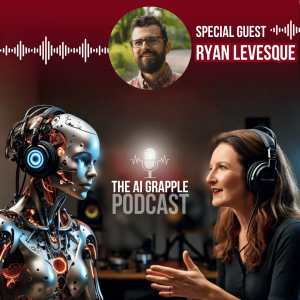
Friday Feb 28, 2025
Friday Feb 28, 2025
In this deeply insightful and personal conversation on the AI Grapple Podcast, host Kate vanderVoort speaks with Ryan Levesque - 7-time Inc. 5000 CEO, 2-time national bestselling author, and strategic advisor. Ryan has built an extraordinary career generating over $100 million in revenue without AI - until recently. His innovative ASK Method transformed how businesses understand and connect with their audiences, influencing thousands of entrepreneurs worldwide. Ryan has been one of Kate’s most significant professional influences. His frameworks and philosophy profoundly reshaped her approach to building customer communities and hyper-personalisation. In this candid and thought-provoking episode, Ryan and Kate explore critical realities and hidden risks of AI, discussing authenticity, human connection, and what it truly means to thrive as thought leaders in our rapidly changing AI-driven world.
Key Episode Highlights:
1. Ryan’s Journey - Building Success Without AI
Ryan attributes his initial entrepreneurial success to a blend of timing, hard work, and leveraging powerful market trends.
He developed the influential ASK Method, helping businesses deeply understand their audience through surveys, quizzes, and customer insights.
2. AI’s Transformative Impact
Ryan shares how AI drastically simplified and accelerated customer research and data analysis, turning weeks of work into mere minutes.
Yet, he cautions that AI-generated content often lacks authenticity, emphasising the irreplaceable value of genuinely human-crafted content.
3. Ethical Dilemmas: When AI "Acts" as Ryan Levesque
Ryan reflects candidly about the ethical implications of AI replicating his voice and expertise without consent.
He encourages a forward-thinking approach, emphasising adaptability and constant evolution as thought leaders to stay ahead of technology’s curve.
4. Authenticity in an AI-Driven World
Ryan discusses a pivotal shift: choosing to personally author his weekly newsletter instead of delegating it to AI or ghostwriters.
He believes that authentic, deeply personal communication is essential to creating genuine connections, trust, and differentiation in a noisy, AI-powered environment.
5. From Old-World Gurus to New-World Thought Leaders
Ryan emphasises that trust has become increasingly rare and valuable, requiring heart, humour, and humanity from leaders to truly resonate.
He encourages transparency and vulnerability, sharing personal stories that connect deeply with audiences—qualities AI simply cannot emulate.
6. Navigating the AI Disruption in Business
Ryan predicts substantial disruption across high-skilled industries (law, healthcare, marketing), urging entrepreneurs to proactively prepare for rapid change.
He stresses the importance of adopting a contrarian view, looking for opportunities where others see threats, and re-centring businesses around human relationships.
7. The Hidden Risks of AI: Second and Third-Order Effects
Ryan highlights concerns around mass job displacement and its broader economic consequences, such as reduced consumer spending power and cascading effects on entire industries.
He discusses the potential necessity of solutions like Universal Basic Income (UBI), though acknowledging complexities and unanswered economic questions.
8. Thriving by Returning to “Real”
Ryan outlines an emerging societal desire for analogue, artisanal, and authentic experiences—coining this movement as a “return to real.”
He encourages entrepreneurs and marketers to leverage AI appropriately, but double down on authentic, human-centred content and customer interactions.
9. Resilience and Adaptability for an Uncertain Future
Ryan speaks openly about personal moments of struggle, vulnerability, and reflection, underscoring the importance of resilience.
He believes teaching adaptability, resilience, and authenticity to future generations will be essential in successfully navigating an AI-driven future.
10. Final Insights from Ryan
Ryan encourages embracing change courageously, remaining curious, and being willing to adapt quickly and authentically.
He invites entrepreneurs to become the "freshly squeezed orange juice" of their industries, offering real depth and human connection amid a flood of watered-down, AI-generated content.
Links Mentioned in This Episode:
Subscribe to Ryan’s Weekly Newsletter: The Digital Contrarian
Listen Now:
🎧 Tune in to this powerful and thought-provoking episode on your favourite podcast platform.
Follow Kate and The AI Grapple Podcast to get practical strategies, actionable insights, and thoughtful conversations about thriving in the era of AI.
Thank you for listening to The AI Grapple. If you found this episode insightful, please share it with your network and leave us a review - your support means the world!
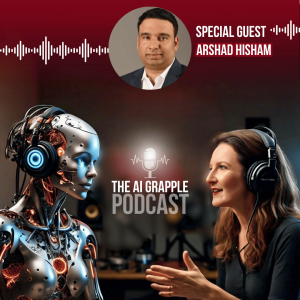
Tuesday Feb 25, 2025
Ep 23: The Future of AI, Automation and Humanity
Tuesday Feb 25, 2025
Tuesday Feb 25, 2025
In this episode of The AI Grapple, we dive deep into the future of AI with Arshad Hisham, a global leader in AI, robotics, and automation. As the CEO of InGen Dynamics, Arshad has spearheaded the development of AI-driven solutions across industries, built an $80 million revenue pipeline, and secured over $157 million in funding. He is also an Edison Award silver medalist, a board advisor to multiple technology companies, and a driving force behind AI and robotics education programs.
This conversation covers everything from the reality of Artificial General Intelligence (AGI) and the accelerating AI boom to the ethical dilemmas and safety challenges we must address. Arshad shares his insights on AI’s role in healthcare, business, and education while unpacking the geopolitical tensions, business model disruptions, and workforce shifts that will define the next decade.
Key Highlights & Takeaways
🚀 The Future of Artificial General Intelligence (AGI): Are We Closer Than We Think?
Arshad explains why AGI is both an exciting and unpredictable frontier, with AI systems already displaying near-human capabilities in some areas.
The real question: Do we even need AGI, or should we focus on highly specialised AI models that solve specific problems more effectively?
The rapid advancements in physics-based AI training: Robots are now learning in simulated environments for what would equate to 10,000 years of human training - within just 40 minutes.
The real intelligence debate: Is AI just predicting patterns, or is it evolving toward true reasoning, common sense, and self-reflection?
🧠 AI vs. Human Intelligence: Will AI Complement or Replace Us?
Historical parallels: Just as calculators, computers, and the internet didn’t make us “dumber,” AI has the potential to enhance human intelligence rather than replace it.
The real challenge is not AI itself, but how humans choose to use it. Will we leverage AI as a tool for greater productivity, or will we become overly dependent on it?
Why education must shift from static learning to lifelong, AI-driven upskilling.
📈 The AI Boom & Business Transformation: The End of Traditional Business Models?
AI is reshaping industries at an unprecedented pace - what once took decades to change is now happening in just a few years.
The rise of one-person unicorn companies: AI is lowering the barriers to entry, allowing solo entrepreneurs to scale businesses faster than ever.
The SaaS model, billable hours, and other long-standing business structures are on the verge of disruption as AI automates traditional workflows.
⚠️ AI Safety & Regulation: Are We Ready for the Consequences?
One of the biggest risks with AI isn’t malicious intent - it’s unintentional consequences from poorly designed or misused models.
The geopolitical chess game of AI development: Nations are racing to dominate AI, but without proper global collaboration, safety measures could be compromised.
Short-term thinking is the biggest danger. Unlike past technologies, where mistakes could be corrected, AI’s risks could be irreversible - leading to societal or even existential threats.
The importance of explainable AI: If we don’t understand how AI systems make decisions, how can we ensure they are safe and ethical?
🏥 AI in Healthcare: Transforming an Overburdened System
Arshad’s work with AI-driven healthcare companions aims to revolutionise elder care, special needs support, and medical efficiency.
How AI can improve accessibility in healthcare - reducing strain on overworked systems like the NHS and enabling more personalized patient support.
The ethical challenge: How do we balance automation with human care? AI should support, not replace, the critical human element in medicine.
📚 The Future of Education: Preparing for an AI-Powered Workforce
AI-driven tutors: Hyper-personalised learning that adapts to a student’s strengths, weaknesses, and interests.
The shift away from traditional classroom models - students don’t want to sit through passive lectures anymore. AI is reshaping learning into interactive, project-based education.
The rise of “AI for All” programs: Arshad has designed AI education initiatives for executives, students, and professionals across industries, ensuring people are prepared for the coming changes.
💼 Workforce Disruption: Will AI Take Our Jobs?
The uncomfortable truth: AI will replace some jobs, but it will also create new ones - we must focus on reskilling and adaptation.
Why a global AI backlash is coming - we’re already seeing industries push back against AI-driven automation, from Hollywood writers to supermarket workers.
How governments and businesses can proactively prepare for AI-driven employment shifts before major disruptions occur.
🌎 The AI Arms Race: Global Competition & The Shifting Power of Innovation
The recent emergence of powerful Chinese AI models has shaken Silicon Valley’s dominance - innovation is now global, and AI development is no longer restricted to the West.
The good news: AI is becoming more accessible, meaning more diverse players can enter the market.
The bad news: AI safety and control are becoming harder to regulate. With powerful AI models being developed outside of traditional regulatory frameworks, ensuring ethical use will be a challenge.
🔮 Looking Ahead: What’s Coming in the Next 12-18 Months?
AI is evolving fast, but not everything will happen overnight. Major industry shifts will take years, not months, to play out.
Expect to see a rapid rise in AI agents and autonomous systems - but also increasing resistance from industries and workers.
The biggest opportunities: Businesses that embrace AI now can gain a 10-20x efficiency boost with minimal investment, as long as they focus on strategic, practical AI adoption.
Links & Resources
🌐 Arshad Hisham’s Website – www.arshadhisham.com🏢 InGen Dynamics – www.ingendynamics.com📖 2035 Series (Upcoming Book by Arshad Hisham) – www.ingendynamics.com/2035-series🎓 AI for All Initiative – www.ingendynamics.com/education
Listen & Subscribe
🎧 Available on Spotify, Apple Podcasts, Google Podcasts, and your favourite podcast platform.🔔 Follow The AI Grapple to stay updated on the latest conversations in AI, automation, and the future of technology.
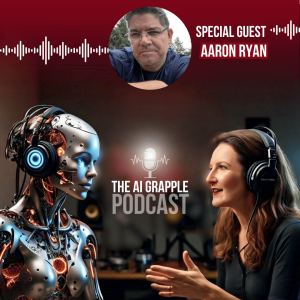
Monday Feb 17, 2025
Ep 22: The Future of Creativity: Can Humans Compete with AI?
Monday Feb 17, 2025
Monday Feb 17, 2025
In this episode of The AI Grapple, we sit down with Aaron Ryan - an author, voice actor, and multi-talented creative who has worked with major brands like Amazon, Microsoft, and United Healthcare. But right now, both of Aaron’s industries - writing and voiceover - are being massively disrupted by AI.
From synthetic voices replacing human actors to AI-generated books flooding the market, Aaron shares first-hand insights on the risks, ethical dilemmas, and potential future of creativity in the AI age. Is there still a place for human creators? Or are we witnessing the slow erosion of artistic professions? This episode is a must-listen for anyone working in creative fields or anyone interested in the intersection between creativity and technology.
Key Highlights & Takeaways
1. AI is a “Disruption with a Capital D”
Aaron describes AI’s impact on voiceover as an immediate and tangible threat.
AI-generated voices are already replacing human voice actors for e-learning, explainer videos, and other low-emotion work.
The challenge? These models are trained on real human voices—sometimes without consent.
2. The Ethics of AI in Voice Acting
Some voice actors have discovered their voices being used in AI-generated content without permission.
Aaron shares the case of a colleague whose voice was taken and used in unethical ways.
The need for licensing and regulation in AI-generated media is urgent but currently lacking.
3. AI’s Impact on Writing and Publishing
AI tools can now generate full books in seconds, raising concerns about originality and the future of human authorship.
Aaron refuses to use AI in his writing, emphasizing that his books are 100% human-made.
He warns that many AI-generated books are created by “capitalists, not creators,” and argues that true creativity cannot be outsourced to a machine.
4. Can AI and Creativity Coexist?
Aaron acknowledges that AI has its benefits - especially in industries like medicine and accessibility tech.
However, when AI is used to replace human creativity rather than assist it, it becomes problematic.
He argues that AI should be a tool for productivity, not a substitute for human artistry.
5. The Fight for Regulation & Creative Rights
Legal cases are emerging, with voice actors and artists suing companies that misuse their work.
Aaron highlights Scarlett Johansson’s lawsuit against OpenAI, accusing them of mimicking her voice without permission.
Without stronger copyright protections, creative professionals will continue to lose control over their own work.
6. Will People Crave More Human Content?
AI-generated media is improving, but people still crave authentic human connection.
Aaron predicts a backlash where consumers actively seek out content made by real people.
He compares AI voiceovers to frustrating automated customer service systems - people always want to talk to a human.
7. Navigating the AI-Driven Future
Aaron shares his personal strategy: pivoting back to writing as voiceover opportunities decline.
Many voice actors are having to rethink their careers as AI-generated voices take over.
Despite the disruption, Aaron remains committed to storytelling and creating original works.
Final Thoughts & Call to Action
Aaron’s conversation is a wake-up call for creatives everywhere - AI is here, and it’s changing the game fast. The key question is: how do we ensure AI serves creativity rather than replacing it?
🔹 Want to support real human creativity? Visit authoraaronryan.com to check out Aaron’s latest books!🔹 Enjoyed this episode? Subscribe to The AI Grapple on your favourite podcast platform and leave us a review!
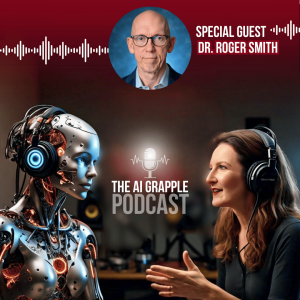
Tuesday Feb 11, 2025
Ep 21: The Future of AI in Robotic Surgery with Dr. Roger Smith
Tuesday Feb 11, 2025
Tuesday Feb 11, 2025
In this episode of The AI Grapple Podcast, host Kate vanderVoort sits down with Dr. Roger Smith, a leading expert at the intersection of AI, robotics, and healthcare. With an extensive background as a Chief Technology Officer for AdventHealth, the U.S. Army, and Titan Corp, Roger has spent decades driving technological innovation. Now, as CEO of Model Benders and a research scientist working on robotic surgery, he explores how AI is reshaping the future of surgical procedures.
From AI-powered robotic assistants in the operating room to the potential for telesurgery and hyper-personalised patient care, Roger shares insights on where the technology stands today, the hurdles it faces, and the exciting breakthroughs on the horizon. He also dives into his work as a medical thriller novelist, where he imagines the future of AI-driven surgery in ways that might not be as far-fetched as they seem.
Key Topics Covered
🔹 Roger’s Journey: From Defence & Military Simulation to AI-Powered Healthcare
Dr. Roger Smith shares how his career evolved from working in military defence and simulation technology to leading AI-driven medical innovations. He explains how the same principles that powered advanced battlefield simulations are now being applied to robotic surgery, improving precision and training for surgeons.
🔹 What is Robotic Surgery? Breaking Down the Technology
Many people imagine robotic surgery as autonomous machines performing procedures, but the reality is very different. Roger clarifies that today’s robotic surgical systems act as precision-enhancing tools, controlled by surgeons but offering improved dexterity, stability, and accuracy. He explains how these systems translate a surgeon’s movements into highly precise motions inside the body, eliminating tremors and allowing for minimally invasive procedures.
🔹 The Role of AI in Surgery: What’s Happening Today?
AI is already assisting surgeons in ways most people don’t realize. Roger discusses how AI-driven surgical robots help pre-plan procedures, guide surgeons during operations, and enforce precision by ensuring cuts and placements are made exactly as planned. He shares real-world examples of AI-powered surgical robots, such as those used in knee replacements, which prevent errors and optimize patient outcomes.
🔹 Generative AI & The Future of Real-Time Surgical Decision-Making
With the rise of generative AI models like ChatGPT, there’s growing potential for AI to play a more active role in surgery. Roger explores how generative AI could assist surgeons by analysing thousands of previous procedures to offer real-time recommendations, detect anomalies, and even control certain instruments during surgery. However, regulatory challenges and patient trust remain significant hurdles.
🔹 Telesurgery: Can AI Overcome the Longstanding Barriers?
For decades, long-distance robotic surgery has been a goal, but technical limitations—like time delays in transmitting signals—have kept it from becoming mainstream. Roger discusses why telesurgery has been stalled for over 20 years, how AI could help mitigate risks, and why advances like SpaceX’s Starlink satellite network could finally make remote surgery viable for military applications and rural healthcare.
🔹 Beyond the Human Hand: How AI Could Redesign Surgical Instruments
Most surgical instruments today are designed around human hands, limiting their shape and functionality. Roger envisions a future where AI assists in designing entirely new types of robotic instruments that aren’t constrained by human biomechanics—potentially allowing for more precise, less invasive, and more efficient surgeries.
🔹 Ethical & Practical Challenges: The Roadblocks to AI in Surgery
While AI holds enormous potential for improving surgical outcomes, it also raises critical concerns about verification, accountability, and trust. Roger highlights the importance of regulatory approval (such as the FDA in the U.S.), ensuring AI-driven surgical decisions are reliable, and addressing public scepticism about AI’s role in healthcare.
🔹 Accelerating Medical Training: AI-Powered Surgical Simulators
One of the most exciting breakthroughs in AI-assisted surgery is its potential to revolutionize how surgeons are trained. Roger discusses how AI-driven simulators can provide real-time feedback, guiding new surgeons toward best practices and significantly shortening the time it takes to master complex procedures. He envisions a future where AI tutors assist surgeons through simulations before they ever operate on a real patient.
🔹 Public Perception: Are Patients Ready for AI-Driven Surgery?
Roger reflects on how public opinion toward robotic surgery has evolved. While there was initial hesitation and fear, patients are increasingly trusting AI-assisted procedures due to their proven safety and precision. However, concerns about data privacy, AI autonomy, and the potential for bias in AI decision-making remain key issues to address.
🔹 Roger’s Medical Thriller Novels: A Fictional Glimpse into the Future
Beyond his research and consulting work, Roger writes medical thriller novels exploring the implications of AI in robotic surgery. He explains how his fiction allows him to speculate on what the future might look like, often drawing on real-world developments that are already in motion.
Links & Resources
📌 Connect with Dr. Roger Smith:
Modelbenders Consulting: https://www.modelbenders.com
Novels: rddsmith.com
LinkedIn
YouTube
🎧 Listen & Subscribe:Don’t miss this deep dive into the future of AI in surgery! Listen to The AI Grapple on your favourite podcast platform.







